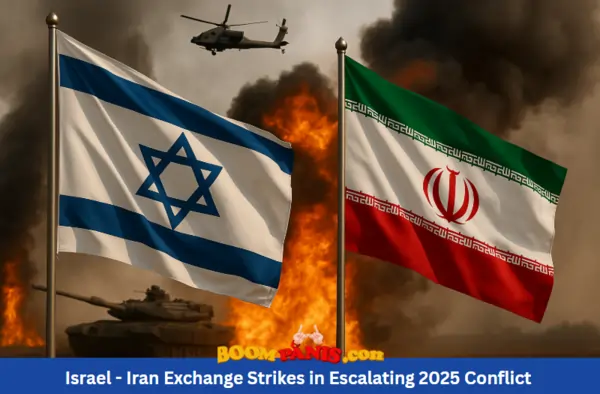Get the latest on the Israel–Iran conflict 2025. Missiles launched, airstrikes hit Tehran. See what happens next in this fast-escalating war.

Tel Aviv, Israel – June 17, 2025
The Israel–Iran conflict 2025 has reached a new level of intensity as missile strikes and retaliatory air raids hit major cities in both nations. World leaders are issuing urgent calls for de-escalation, fearing the crisis could evolve into a full-scale regional war.
Israel and Iran Exchange Strikes Amid Tensions
Over the weekend, the Israel–Iran conflict 2025 escalated dramatically. Israeli fighter jets carried out coordinated airstrikes on Iranian military sites, responding to drone threats near its northern border. In return, Iran launched missiles targeting strategic infrastructure in Tel Aviv and Haifa.
Dozens have been reported dead, with many more injured. Health authorities in both countries have declared emergency responses as civilian casualties mount.
Verified reports indicate dozens of civilian and military casualties on both sides. Medical teams in Tehran and Israeli cities are working around the clock, with hospitals overwhelmed by the sudden surge of the wounded.
A Conflict Years in the Making
The recent escalation of Israel–Iran conflict 2025, follows years of simmering tension over nuclear negotiations, regional influence, and proxy confrontations. The June 14 interception of Iranian drones near Israeli airspace is believed to have triggered the Israeli offensive.
“This is not just a military operation—it is a direct message to any entity threatening our borders,” said Israeli Prime Minister Eli Shafir in an emergency press briefing.
Iran’s response was equally forceful. President Majid Karimi declared on national television, “We will not tolerate aggression. The sovereignty of the Islamic Republic is non-negotiable.”
Civilian Toll and Infrastructure Damage
Airstrikes in southern Tehran destroyed parts of a military depot and disrupted power across nearby neighborhoods. Meanwhile, missile strikes in Israel damaged key transport routes and led to temporary blackouts in Haifa. Emergency crews have been deployed, but many areas remain inaccessible.
“We heard a loud boom, then everything shook. The sky turned orange,” shared Leila Nour, a resident of Tehran who fled her apartment with her two children.
In Israel, residents spent the night in underground shelters, fearing further attacks. Relief agencies have begun distributing aid, though access to some zones remains restricted.
World Leaders Respond
The United States called for restraint, dispatching diplomats to both nations. UN Secretary-General António Guterres issued a statement urging both governments to “step back from the brink of all-out war.”
European Union leaders condemned the attacks and have called for an emergency summit in Brussels. “We urge both sides to prioritize diplomacy over destruction,” said EU High Representative for Foreign Affairs Josep Borrell.
Russia and China, meanwhile, have expressed concerns over the potential expansion of the conflict and have warned against foreign intervention.
Markets React to Middle East Tensions
Global financial markets showed signs of distress as the situation unfolded. Crude oil prices surged past $130 a barrel, the highest since 2022. Airlines rerouted or suspended flights over the conflict zone, while international investors moved to safer assets amid rising uncertainty.
Economic analysts warn that if the conflict intensifies, the ripple effects on global trade and energy supply chains could be significant.
The Risk of Wider Regional War
Analysts suggest that the current hostilities are driven by more than immediate threats. Long-standing disputes over Iran’s nuclear ambitions, Israeli defense strategies, and regional power dynamics are at play.
“The conflict is no longer confined to proxy battles,” said Dr. Lena Harari, a Middle East expert at the International Policy Institute. “This is a direct confrontation between two powerful nations with regional and global implications.”
Both nations have signaled the possibility of further military action if provoked, raising fears of a broader regional war involving neighboring states.
Is Peace Still Possible?
While diplomatic channels remain open, both governments show no signs of backing down. Peace efforts from neutral parties such as Qatar and Turkey are underway, but observers caution that mutual distrust and domestic political pressures may hinder progress.
U.S. Secretary of State Linda Marcus is scheduled to meet regional leaders in the coming days in a bid to broker dialogue.
A Critical Moment for Global Stability
The United Nations has called an emergency session to address the Israel–Iran conflict 2025, while the United States urges both sides to show restraint. European Union leaders issued a joint statement condemning the violence and urging peace.
“Israel–Iran conflict 2025 threatens more than just two nations—it threatens global peace,” said EU Foreign Policy Chief Josep Borrell.
📌 Disclaimer
This article is based on currently available information as of June 17, 2025. Events are developing rapidly, and updates may follow. The content is for informational purposes and reflects reports from verified sources at the time of publication
📚 Sources and References
- The Guardian: Trump Tells Tehran to Evacuate – June 17, 2025
- The Guardian: Explosions Over Tel Aviv – June 15, 2025

Bianca Marie Reyes, aka Tita BoomBi, is a 30-year-old Filipina content creator who turns everyday chika into real talk and real-time news. Known for her witty takes and no-fake-news style, she breaks down viral stories, headlines, and public updates into fun, bite-sized content for the digital Filipino. She’s your online tita, always tuned in and always telling it like it is. With a mix of humour and honesty, she keeps things relevant, relatable, and 100% not fake.
